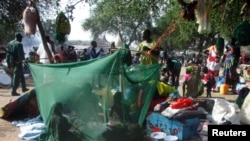Regional leaders are calling for an immediate cessation of hostilities in South Sudan as warring factions plan to begin peace negotiations in Ethiopia’s capital, Addis Ababa Friday, according to Fred Opolot, Uganda foreign ministry spokesman.
Opolot says regional foreign ministers from the Intergovernmental Authority on Development (IGAD), including Okello Oryem, Uganda’s state minister for international affairs, have urged the two South Sudan factions to ensure there is ceasefire as part of the ground rules at the beginning of the peace talks.
“The technical team will start [Friday] in as far as laying the ground rules of the talks [are] concerned,” said Opolot. “So, what the facilitators of the talks will focus on will be the ground rules and they will share that with the protagonists of South Sudan. The ground rules may actually take quite a few days.”
Ethiopia’s Prime Minister Hailemariam Desalegn is backed by IGAD, a regional bloc to be the mediator for the peace negotiations.
The violence in South Sudan erupted after President Salva Kiir, a Dinka, accused former vice president Riek Machar, a Nuer, of attempting a coup. Mr. Marcher, who is in hiding, has denied the accusation.
News reports say ethnic tension between the two groups is fueling the conflict, with members of the Nuer and Dinka ethnic groups targeting each other.
Some observers say fighting continues in parts of the country in spite of recent IGAD, African Union, United Nations and others in the international community’s demands for ceasefire.
On his recent visit to South Sudan as part of an effort to help resolve the security crisis there, Uganda President Yoweri Museveni said East African nations have warned South Sudan’s former Vice President Riek Machar to comply with a cease-fire or face action by regional nations.
Opolot says regional leaders continue to find ways to end South Sudan’s conflict.
“The leaders are right now doing what they can to ensure that some semblance of peace returns to South Sudan. They are working hard, they are communicating they are consulting…the want a cessation of fire before [peace] happens,” said Opolot. “They talked to both Riek Machar and President Salva Kiir and the good thing about all this is that people have actually agreed to come to the table and [negotiate].”
The UN estimates that over 1,000 people have been killed and tens of thousands displaced from their homes due to the ongoing clashes between the two warring factions in South Sudan.
Opolot says regional foreign ministers from the Intergovernmental Authority on Development (IGAD), including Okello Oryem, Uganda’s state minister for international affairs, have urged the two South Sudan factions to ensure there is ceasefire as part of the ground rules at the beginning of the peace talks.
“The technical team will start [Friday] in as far as laying the ground rules of the talks [are] concerned,” said Opolot. “So, what the facilitators of the talks will focus on will be the ground rules and they will share that with the protagonists of South Sudan. The ground rules may actually take quite a few days.”
Ethiopia’s Prime Minister Hailemariam Desalegn is backed by IGAD, a regional bloc to be the mediator for the peace negotiations.
The violence in South Sudan erupted after President Salva Kiir, a Dinka, accused former vice president Riek Machar, a Nuer, of attempting a coup. Mr. Marcher, who is in hiding, has denied the accusation.
News reports say ethnic tension between the two groups is fueling the conflict, with members of the Nuer and Dinka ethnic groups targeting each other.
Some observers say fighting continues in parts of the country in spite of recent IGAD, African Union, United Nations and others in the international community’s demands for ceasefire.
On his recent visit to South Sudan as part of an effort to help resolve the security crisis there, Uganda President Yoweri Museveni said East African nations have warned South Sudan’s former Vice President Riek Machar to comply with a cease-fire or face action by regional nations.
Opolot says regional leaders continue to find ways to end South Sudan’s conflict.
“The leaders are right now doing what they can to ensure that some semblance of peace returns to South Sudan. They are working hard, they are communicating they are consulting…the want a cessation of fire before [peace] happens,” said Opolot. “They talked to both Riek Machar and President Salva Kiir and the good thing about all this is that people have actually agreed to come to the table and [negotiate].”
The UN estimates that over 1,000 people have been killed and tens of thousands displaced from their homes due to the ongoing clashes between the two warring factions in South Sudan.





